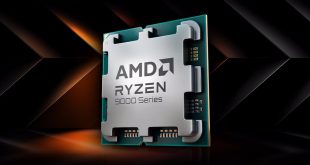We are fans of the new AMD 1090T (3.2ghz) and 1055T (2.8ghz) – 125W TDP processors which target the mid range Intel solutions.
Both of these CPU's are proving to be good sellers for AMD as they are competitively priced, with particular emphasis on the 1055T which retails for around £160 in the UK right now.
Japanese site Akiba has taken pictures of the Phenom II X6 1055T, but here is the kicker, a new version is shipping with 95W TDP, 30w less than the original design. So what does this mean to you? Obviously this means that it consumes around 25 percent less power at reference clocks which promotes the ‘green' aspects of the new release, but more importantly for KitGuru readers with a lower power consumption under full load, the overclocking characteristics improve.
KitGuru says: AMD isn't listing the 125W model at this time, so we can assume that the new 95W processor – HDT55TWFK6DGR (tray) and HDT55TWFGRBOX (retail) – will hit retail very shortly.
Special thanks to Hexus for the information.
Discuss in our forums or just leave a quick comment below.
 KitGuru KitGuru.net – Tech News | Hardware News | Hardware Reviews | IOS | Mobile | Gaming | Graphics Cards
KitGuru KitGuru.net – Tech News | Hardware News | Hardware Reviews | IOS | Mobile | Gaming | Graphics Cards





This is a really good idea from AMD, should help overclocking by at least 200mhz per ship. In theory anyway, right?
same price? thats excellent. will need to be careful when ordering however. they really should rename it as people will obviously send up with the older high power model from stores.
Going to be a nightmare to get the right one as most stores online dont list the SKUs correctly. They should just have brought out a new model, like 1056T. would make it easier for everyone.
@ Trev Mang – not necessarily. every chip is different and it might actually mean better yields for AMD rather t han a huge difference in overclocking.